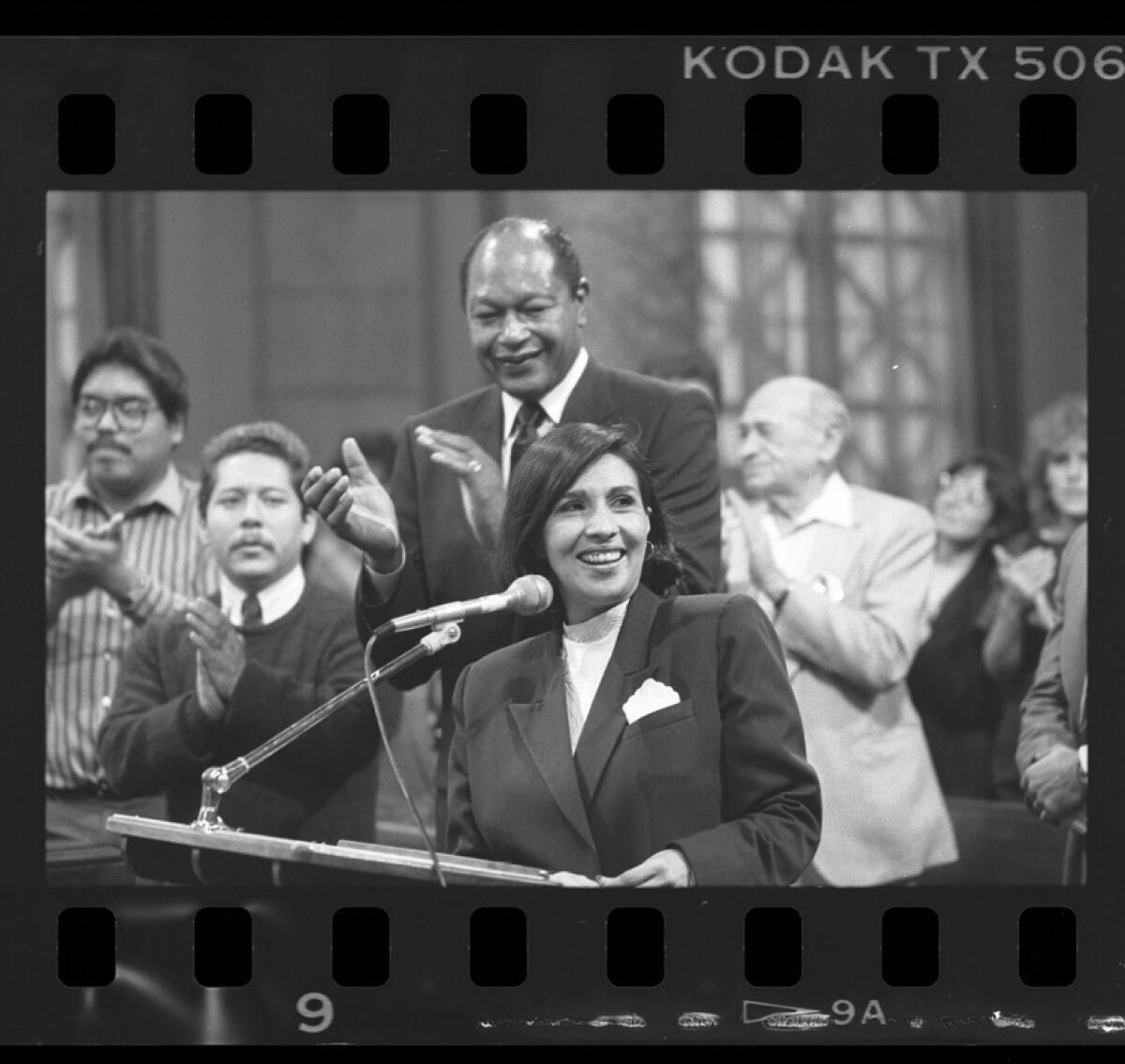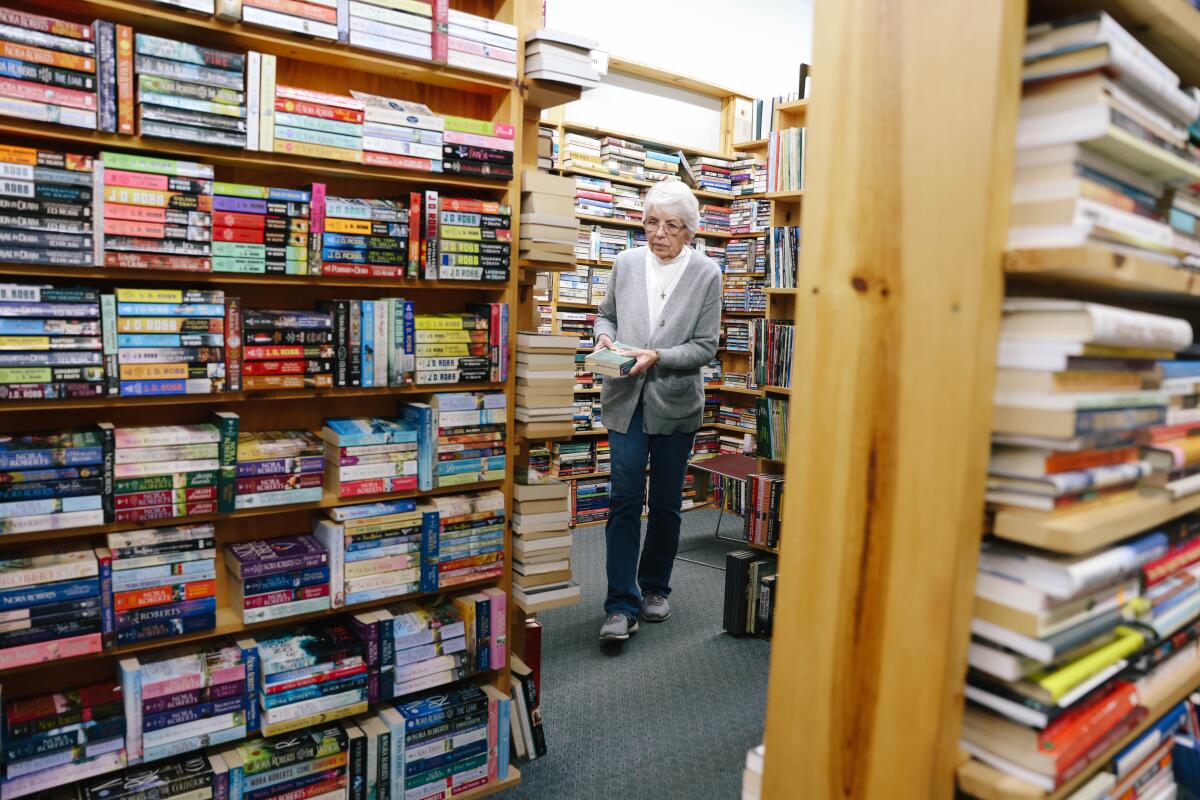The story of Latino political power in Los Angeles

- Share via
Good morning. It’s Tuesday, Feb. 27. I’m Gustavo Arellano, a metro columnist for The Times, which means I’m allowed to share my opinions, like this:
Covering Latino politics in Los Angeles is a trip.
But before I get into that, here’s what you need to know to start your day:
- Republicans to launch another long-shot effort to recall Newsom
- Nineteen exceptional San Diego hikes for outdoor enthusiasts
- And here’s today’s e-newspaper.
Sign up for Essential California
The most important California stories and recommendations in your inbox every morning.
You may occasionally receive promotional content from the Los Angeles Times.
Power y Glory
I’m a lifelong Orange County resident who spent the vast majority of my career covering the craziness that is O.C. I knew the big names in L.A. Latino politics over the decades: Gloria Molina, Antonio Villaraigosa, Alex Padilla, Hilda Solis and others. I even talked to some occasionally for stories.
But I never imagined I’d ever cover them for a living, even after I joined The Times in 2019.
I was supposed to cover Southern California, not the machinations of bare-knuckle politics in a city where it’s a sport. But, to paraphrase Michael Corleone in “The Godfather Part III,” just when I thought I was out, Alex Villanueva pulled me back in.
Covering the downfall of the former L.A. County sheriff in 2022 was my introduction to a whole new world that I found irresistible. That year’s leaked audio exposing L.A. City Council members making racist comments — for its coverage, The Times won the 2023 Pulitzer Prize for breaking news — made me realize I needed to pay more attention and also try to connect the proverbial dots, some dating back decades.
Then came the election-night party of Imelda Padilla. She won a special election last summer to replace Councilmember Nury Martinez, her former boss who resigned for saying bigoted remarks against Black children and Oaxacans on the leaked tape. Padilla’s celebration was a bona fide coronation: council members, congress members, community leaders and other power brokers all offering their congratulations.
That’s when I asked myself: How did Latino politics in Los Angeles get to this moment?
Nearly six months later, I have some answers.
The series
“Power y Glory: Latino Politics in Los Angeles” is a four-part dive into the key moments and players of the scene, with a focus on four areas in the city and the 2024 races that best exemplify their political trials and triumphs.
I start in the Eastside, the cradle of Latino power and a place perpetually in political desmadre — chaos. I zero in on the race to take down Councilmember Kevin de León, the last person standing who participated in the tape leak. He represents District 14, which takes in downtown, Boyle Heights and Eagle Rock. Its voters have never met a controversial councilmember they didn’t elect, then move on to run for higher office (hola, Antonio and Kevin) or resign in disgrace (that’s you, Art Snyder and Jose Huizar).
Part 2 of the series goes up the 5 Freeway to the eastern San Fernando Valley, where U.S. Senator Alex Padilla and his Beltway roommate, Rep. Tony Cárdenas, have spent 30 years building a political dynasty worthy of “The Crown.” The discipline here is the antithesis to the messiness of the Eastside. But in the wake of Martinez’s resignation and Cárdenas’ announcement last fall that he wouldn’t seek reelection, political observers are asking how long can the San Fernando machine hold.
For the record:
12:00 p.m. Feb. 27, 2024An earlier version of this article reported that Sade Elhawary, Efren Martinez and Dulce Vasquez are seeking a seat on the Los Angeles City Council. They are running to represent state Assembly District 57.
Part 3 focuses on South Los Angeles, the historical heart of Black L.A. but a place that has been majority Latino for at least a quarter of a century. A trio of candidates — Sade Elhawary, Efren Martinez and Dulce Vasquez — are seeking to become the first Latino to represent South L.A. since Edward R. Roybal did so on the city council in the 1960s. Can any of those candidates represent South L.A.’s Latino majority but also reassure Black residents that their needs will be heard and their long-fought-for power not disappear?
The series concludes in the cities of Southeast L.A. County — SELA, as the cool kids call it, or the “corridor of corruption” per former Speaker of the Assembly Anthony Rendon. A new generation of Latino councilmembers are trying to work past the region’s scandal-plagued past by working together. Two of them, Bell Mayor Fidencio Gallardo and Huntington Park Councilmember Graciela Ortiz, are running for a seat on the Los Angeles Unified school board.
They are also facing an interesting dilemma, one that more Latino elected officials across Southern California and beyond will encounter as the country’s demographics continue to change: What does it even mean to be a “Latino” politician when Latinos are the super-majority of the population?
Why my series matters
Um, because I wrote it? Kidding! “Power y Glory” is important to read because all Angelinos should know about the different nodes of political power in Latino L.A. It’s city history, after all, not just Latino history. Within all these stories are cautionary tales, heroes, villains and lessons to make a better city for everyone — and to avoid the mistakes of the past.
All the articles come out today online and will appear in the paper throughout the week. If you have any bon mots rants, or chisme — gossip — do email me at gustavo.arellano@latimes.com. Have fun!
Read more from Gustavo’s series diving into Latino politics in L.A.
Today’s top stories

Business
- A Kroger-Albertsons mega-merger would cause grocery price hikes, the FTC says in a suit to block the deal.
- The Clippers unveil a new logo with compass and ship. Here’s where to buy merchandise.
- Disney’s ‘Mandalorian & Grogu’ to shoot in California thanks to a huge tax credit.
- Sean Bailey, Disney’s live-action film boss, is leaving the company.
Crime and courts
- Supreme Court questions whether Texas and Florida can regulate social media to ‘protect’ speech.
- The ex-FBI informant who allegedly lied about the Bidens will remain behind bars, a judge rules.
- The Mexican Mafia, a hit list and a swallowed note: A criminal defense attorney has been charged in a murder plot.
- Squatters set up at a Hollywood Hills home. When police knocked, an OnlyFans model answered.
- An FBI analyst describes damage to Alec Baldwin’s ‘Rust’ gun in armorer criminal trial.
Politics and elections
- California takes up the White House’s call to toughen gun storage rules.
- Despite scandal, the race for Kevin De León’s seat has been lacking in fireworks.
- A group of Republicans involved in the failed 2021 recall of Gov. Gavin Newsom plan to launch another long-shot effort to recall the governor.
- Meet some of the biggest donors shaping California’s U.S. Senate race.
- Immigration rises to the top of voters’ minds ahead of Super Tuesday, polls find.
Awards
- One of the protesters disrupting the 2024 Spirit Awards was a previous winner.
- After PGA Awards win, the Oscar for best picture is ‘Oppenheimer’s’ to lose.
More big stories
- Has this been L.A.’s wettest February ever? What the rain forecast has in store.
- Sylvester Stallone and his family are ‘permanently’ leaving California for Florida, joining thousands who have made the move in recent years.
- Looking to buy or sell a home this spring? Here’s what to expect.
- ‘What is this, “The Handmaid’s Tale”?’ Exploring moral questions posed by the controversial IVF ruling in Alabama.
- A Beverly Hills middle school has been rocked by AI-generated nude images of students.
- Conservationists are trying to buy a woodsy hollow in Laurel Canyon rooted in flower power.
Get unlimited access to the Los Angeles Times. Subscribe here.
Commentary and opinions
- Editorial: Biden doesn’t need to weaken EV rules to get reelected.
- Dylan Hernández: It’s clear Lionel Messi’s magic is fading after young Galaxy expose Inter Miami star.
- Editorial: Confused about judges on the March 5 ballot? L.A.’s judicial elections explained.
- Jackie Calmes: The Republican Party promised to give new meaning to ‘pro-life’ after Dobbs. How’s that working?
- Jonah Goldberg: Nikki Haley keeps losing — and revealing something important about Trump and Republicans.
- LZ Granderson: Newsom’s ads against red states’ abortion travel bans aren’t just a stunt.
- Michael Hiltzik: Vanguard, one of our top investment firms, shuns crypto ‘like the plague.’ That’s good for its customers.
Today’s great reads
Nearing 80, she can no longer afford to own Arcadia’s Book Rack — or live in California. “The miracle is coming,” Karen Kropp often assured herself. “When you’re in a bookstore, you have to be a dreamer.” But the miracle never came, and Kropp, who turns 79 this year, knew that even if she couldn’t really afford to, it was time to retire.
Other great reads
- Use your hair to help your garden or fight pollution. A Bay Area group shows how.
- With a chainsaw and imagination, he handcrafts one-of-a-kind wood furniture.
- Mercado González in Costa Mesa is the first Mexican-style mercado of its kind in Southern California — and a sign of one city’s shifting politics.
How can we make this newsletter more useful? Send comments to essentialcalifornia@latimes.com.
For your downtime
Going out
- ⛰️For outdoor enthusiasts, San Diego County boasts so much more than just its stunning shoreline. Here are 19 exceptional San Diego hikes.
- 🎭 ‘Back to the Future’ and ‘Some Like It Hot’ lead Pantages 2024-25 season.
Staying in
- 📙 ‘The Bloodied Nightgown’ is a monument to Joan Acocella’s savage wit and unsentimental generosity.
- 📺 ‘Shogun’ — premiering Tuesday on FX and Hulu — is an epic remake that focuses on feudal Japanese politics over romantic drama.
- 🥗 Here’s a recipe for Caribbean turkey salad with orange vinaigrette.
- ✏️ Get our free daily crossword puzzle, sudoku, word search and arcade games.
And finally ... a great photo
Show us your favorite place in California! Send us photos you have taken of spots in California that are special — natural or human-made — and tell us why they’re important to you.

Today’s great photo is from Times photographer Brian van der Brug from the Screen Actors Guild Awards, where A-listers brought their A-game to the red carpet.
Have a great day, from the Essential California team:
Gustavo Arellano, columnist
Kevinisha Walker, multiplatform editor
Stephanie Chavez, deputy metro editor
Check our top stories, topics and the latest articles on latimes.com.
Sign up for Essential California
The most important California stories and recommendations in your inbox every morning.
You may occasionally receive promotional content from the Los Angeles Times.









